Now and Then, Here and There
Now and Then, Here and There (2000) is a fascinating anime. Plainly, it is about a kid who is sucked to another world by helping a mysterious girl and wants to return home. Going to the other world, he must save her and possibly overthrow the hegemony of a mad dictator. It seems similar to Alice in Wonderland but far from its childish playfulness. I like this anime not for its dark themes but how it presents its story. It is gripping and hypnotizing all throughout without being dramatic or superfluous although this is not for the faint of heart or the casual.
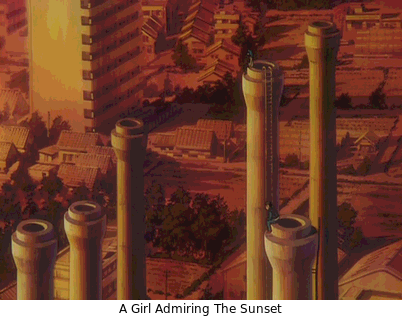
What inspired me to write an article is its ending. After watching, I felt stunned and lost. This analysis is a way for me to cope and understand and what it all meant. That itself is saying much about my experience and its quality.
SPOILERS AHEAD
The End
We start at the end: the ending. As the usual story goes, our protagonist, Shu, returns home and the castle in the sky destroyed. In that respect, the ending should be a joyous occasion. Sadly, Lala vanishing makes the adventure fruitless from a hero's perspective.
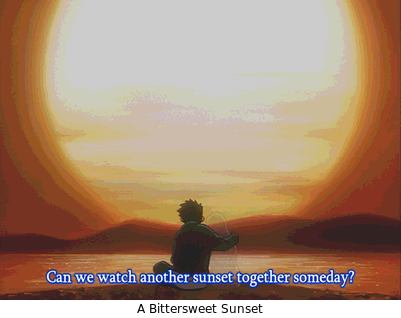
This is compounded by Sara staying in the other world. Initially, she has the strongest desire to go back; by choosing to give life, she hopes that all her suffering will bear fruit someday.
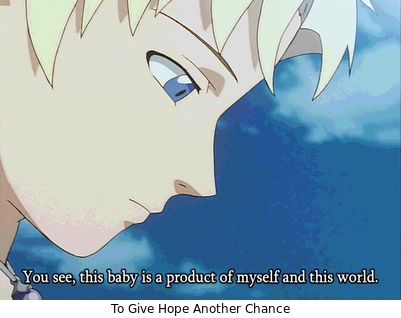
When all said is done, Shu is back to where he came from. Nothing is brought or returned as if everything was a dark dream.
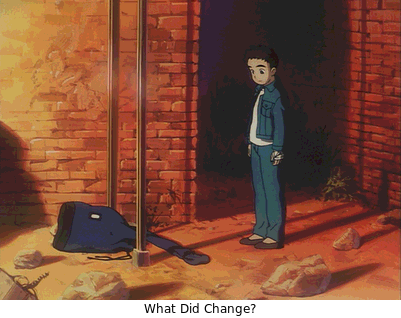
With the final lingering shot, how can we interpret this ending? In comparison, The Wizard of Oz (1939) resolves issues within the dream while The Chronicles of Narnia series carries lessons over. Here, our protagonist has no issue aside from being a rash and impulsive boy. In the end, he still is a rash and impulsive boy although slightly improved.
This ending can be a case for the futility of war. What did all the fighting accomplish? Nothing but the loss of Nabuca, Sis, Boo and countless other lives. It can be also the value of life since Shu persuades people to live and Sara keeping the baby despite strong reasons to the contrary. Many interpretations exist but how do we go about it? To begin our analysis, I want to focus on an element of the story: character development.
Character Development
A character with much development is Sara; despite being the protagonist, Shu does not change or develop. Another way to put it is that the other world has changed Sara while it left Shu unchanged. This idea can be explored with Nabuca and Tabool.
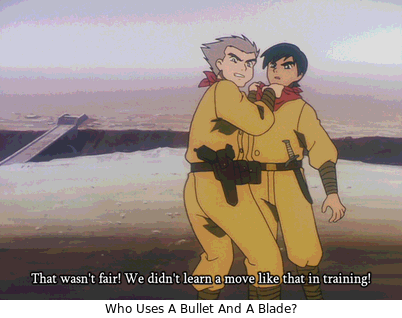
Both of them came from the same village yet are changed differently. In power, Nabuca is clearly stronger and controlled than Tabool; in status, Nabuca is a faithful soldier while Tabool is a political animal. As with Shu and Sara, both wanted to go home yet decide differently. Near the end, Nabuca wants to stop killing while Tabool wants to continue and eventually take over Hamdo's empire. That difference culminates in Tabool betraying Nabuca.
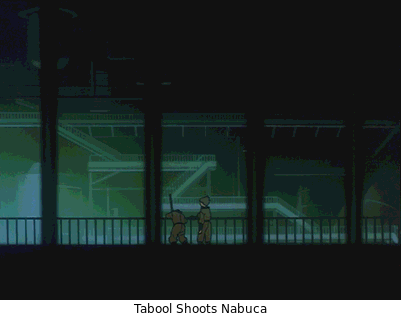
Regardless, both of them die and consequently neither of them go back to their village; however, Nabuca has a more meaningful story death than Tabool whose death last less than a second of screen time. Another way of looking at it is that since both were changed by the war, the story does not allow them to return home.
Thinking about our main pair, Shu returns home with his morals while Sara does not who was broken by captivity. When their values were tested, Shu does not kill Nabuca while Sara kills her rapist. Therefore, is this story talking about maintaining humanity?
Humanity and Backstory
How does war change people? Rather, how does war break people? Shu could have been broken several times in the story but remains rooted. Despite having little development, he is the only character that keeps his values, a fixed point.
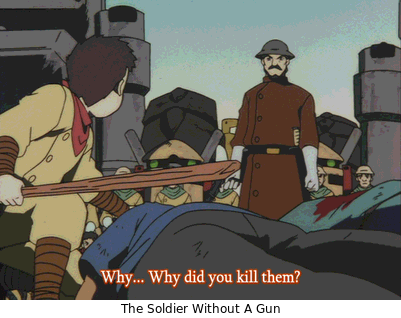
What is humanity or integrity? A complex question for anyone to answer. Here, I mean it as a quality of keeping character and belief but that itself is a vague answer. Instead, I want to point out another element in the story that relates to it: backstory or the lack of it.
Given thirteen episodes, what do we know about our characters? Nothing substantial. I do not know who Shu, Lala, Nabuca or anyone else. Why is Hamdo crazy? Was he a good person before he went crazy for Lala? Why is Abelia faithful to Hamdo? Were Nabuca and Tabool good kids before? How old is Lala? Why is Shu naive to a fault? I can go on but the backstory is definitely lacking or missing.
Commonly, a backstory is used to empathize and understand a character's motivation and actions. The key word is empathy. By empathizing on characters, it changes your perception or judgment on their action and consequences.
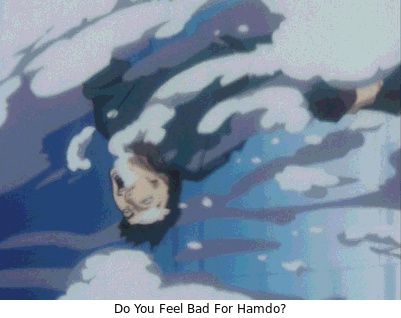
Consider Hamdo's death. In the story, Hamdo is presented as a weak and paranoid dictator. His death might be fair judgment on his actions. Imagine, if Lala made Hamdo crazy or was the reason? What if Hamdo was a great and benevolent dictator, broken by time and circumstance? If the backstory existed, would it change your personal judgment? Concrete examples are Lelouch from Code Geass or Homura from Puella Magi Madoka Magica if my example is lacking.
By ignoring the backstory, the characters can only be judged within the context of the story. It is their current actions that will define them, not by how justifiable and tragic their past stories are. This idea is exemplified in the child soldiers. Aside from Shu, Nabuca and Tabool, Boo is the other soldier who appears neutral, not unchanged, by the situation. We cannot say if his hands are dirty without past information, but within the story he is good, further amplified when he takes a bullet for Nabuca. A backstory exists within the story but not enough to completely paint them.
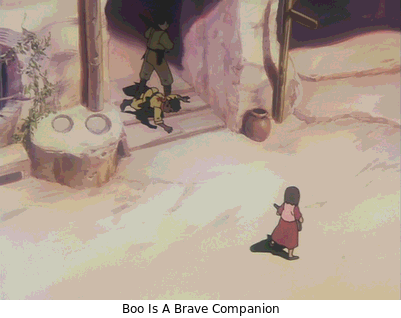
The lack of backstory is asking us to make a fair judgment, but what are we to judge? Humanity? Our characters are forced into this situation, we should not care who they were, but who they are now. We are to judge the effect of war on their character.
In the first place, why should people stay true in dire times specially for children placed in the horrors of war? Even without the backstory, we can empathize how broken they are by their situation. To dig deeper, we explore the mysterious character of Lala Ru.
Lala Ru
Because ten billion years' time is so fragile, so ephermal… it arouses such a bittersweet, almost heartbreaking fondness
Lala, the main heroine, is passive, not incapable. She has the power of water although at the cost of using her life force. Why does she allow people to use or abuse her?
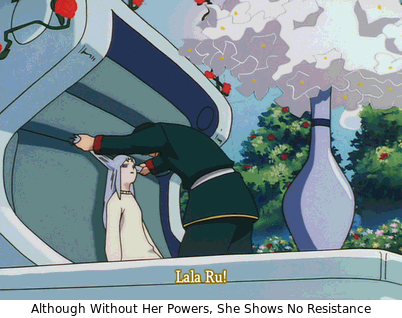
With her powers, Lala shares to Shu that she had been kind but has been neglected and hunted. She believed she was doing good but it brought more danger and chaos, thus she does not waste it for humanity. This somewhat explains why she shows passivity or disdain instead of force or power when threatened. If she tried to resist, she would use her life force; after many times, silence seems to be louder.
Going back, Shu responds that her power is ultimately for good and good people still exist, such as himself and motherly Sis. What this tells us that Lala has lost hope as with Sara. Based on the previous ideas, Lala is not allowed to return home by the story. Strange enough, where is her home? Where will she return to?
If Lala's power is water and it depends on her life force, is Lala the sea that fills the barren wasteland with life? Should Lala return to the earth or ether?
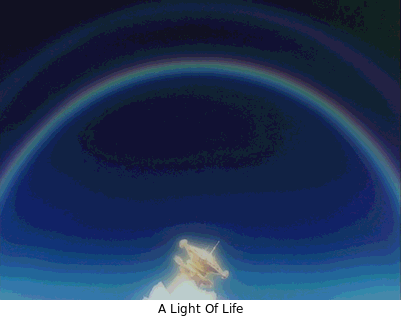
This is speculation why Lala disappears in the end that conveniently ties into the ideas presented. The question still remains to where Lala should return. If she lives, does she go with Shu, stay with Sara or something else entirely? Lala is mysterious and ethereal enough that believing she is a magical being is not far off. The opening remark can be a hint.
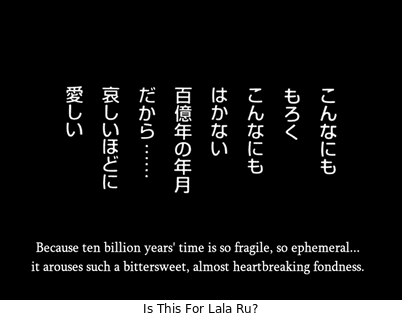
Based on this, the other world might be set in a post-apocalyptic future, not necessarily the same timeline as the original world. This might roughly indicate Lala's age that implies her home is somewhat timeless. What is fascinating about ten billion years is that the sun may roughly die at the time. It implies not just the sun, but humanity and life itself.
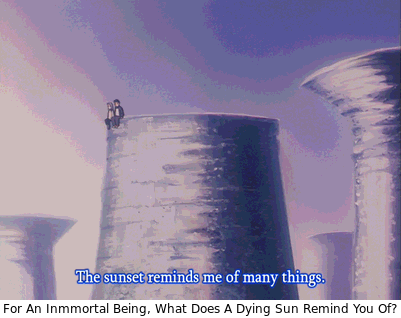
This somewhat explains her fascination with sunsets, not sunrises. If I were her that lost hope, I want to wait for the sun to close my eyes and make my bed. If Lala is practically immortal, a dying light is a consoling and understanding friend. In comparison, she may not be like C.C. from Code Geass, but both share the isolation and burden of their powers.
Sadly, connecting the opening remarks with Lala is flimsy since no text supports it but it does set a tone for which we can read from. It would have helped connect the dots if someone described the world even for just a minute. What we do now that Lala has lived for thousands of years and much of our reasoning somewhat holds.
Without a defined home, she breaks the idea or need to return home, thus she is the exception. Instead, notice her final act is of sacrifice. By using her power to sink the flying fortress knowing the drawback and reason, she shows her restored faith and hope in humanity. Phrased differently, Lala was looking for hope.
Urged by both the goodness of Shu and Sis, Lala shows both hope and action. It is strange that Lala has not met good people for her to have this problem but this is a backstory in itself. What is the story asking by making the protagonist save her? This leads us to explore what hope is in exploring the message.
Hope and Optimism
Another hard question, what is hope? Like with humanity, I can only mean it here as quality of optimism or expectation for good things to come. Instead, how does the series use the theme of hope or optimism? Easily, Shu is the story's hope.
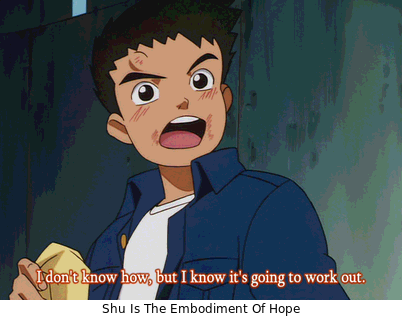
Consider Nabuca and Tabool, Nabuca is doing all the atrocities required of him so that he can go back home; however, Tabool has abandoned the false hope and embraced the belief of being the dictator. When Nabuca discovers that their village was scorched after being taken, he puts his misplaced hope in Shu returning in his stead. Nabuca's change comes from Shu unwavering humanity and disruption of their ranks and becomes his hope in the end.
Consider Sara, she poses the most direct challenge to Shu. She was taken, raped and soiled, how can she have hope in living in suffering? This is in contrast with the child soldiers who creates suffering instead of receiving. When Sara attempts to kill herself and by extension her unborn child, it a powerful question to Shu's philosophy of optimism and hope.
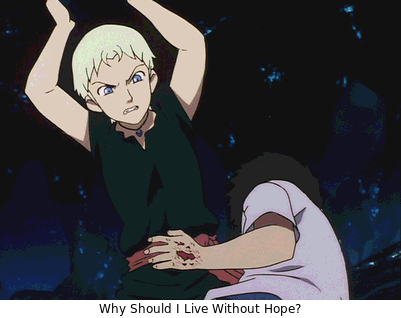
The hard thing to see here is that a child represents the hope of its parents. Both Shu and Sis convince Sara to keep the child that represents hope, not a burden or a taint. This answer affirms Shu and the story.
Consider Abelia, the scene where he lets Hamdo die is her loss of hope or faith in him. Why has she been faithful to him all this time, we may never know. Looking closely, it is Abelia that gives Shu a chance to survive by not killing him. She is averse to killing yet has to out of orders. In the end, what is left for her but to find a new hope to carry on.
Going back to Lala, she has lived for thousands of years and has lost hope in humanity. Applying Shu's optimism to Lala's plight, Shu's arrival is the hope or goodness her immortal life is anticipating. The final conversation of Shu with Sara affirms this message of hope.
SHU: Sara, you know, you once said I lied to you?
Remember that?
I still believe I was right.
No matter where you are, whatever adversities you face,
as long as you've got your life, something good is bound to happen.
Something so totally awesome that would make up for all the bad stuff.
Sure, it can get pretty tough in the meantime.
I don't quite know hot to put it but... you know... um...
Well, there you have it!
In a way, Lala's disappearance makes sense when Shu's unwavering humanity is put forward. Like with Nabuca, she is granted a meaningful yet bittersweet death by completing her character arc.
A subtle inference with this idea is that if Lala cannot be judged by changes in war, then was she the cause? Rather, is she the judge that deserves an answer to the chaos of her existence? In a way, she is the beginning and the end of the story and of the world. This is speculation but an interesting guess that reminds of Lady Koto in Kyousougiga who causes the story by her love and existence.
Returning Home
Going back to the ending, we return to the original world with the original question: what did change? Rather, should anything change? Shu coming back from war without changing is clever. Soldiers returning from war can develop posttraumatic stress disorder (PTSD) by the experiences and hardships of war. Many films and games have discussed this in greater detail such as First Blood from Rambo series and Spec Ops: The Line that I might not be fit to address. Regardless, our protagonist does not develop this crippling disorder by virtue of his unwavering humanity.
In the context of the disorder, it is good that Shu remained himself despite his challenges. This ending cleverly undermines character development in the context of tragedy or hardships. Simply, to not change is better than to change for the worse. This is not a prescription or cure of the disorder but a message to never lose oneself. It is sad that nothing is gained but nothing was lost that also ties in the theme of futility of war.
By virtue of Shu returning home, the ending and story is telling us to remain hopeful or true despite the lack of it. You could claim the final discussion was the message but we needed to understand why this hopeful message was shadowed by a return to zero and what it meant. For Nabuca or Sara, the return is not zero. As the viewer, are we still here and there?
Conclusion
At last, I am at peace with this anime. I do admit that the backstory, world building, character development, animation and portrayal of dark themes might be lacking; however, the somber and sublime story it tells towers over its faults. At the end, I felt I wanted to watch a sunset with Lala Ru someday. Not of affection but of solace.
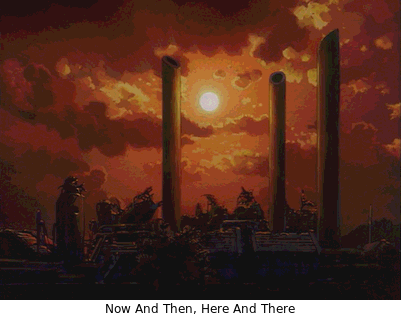
A true favorite anime I can watch now and then.